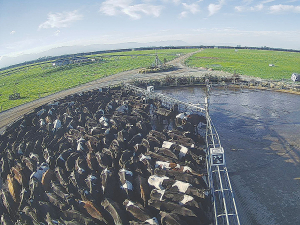Anyone who has spent time in a milking shed will know the chore of climbing out of the pit to bring lethargic cows forwards is a pain in the proverbial.
Of course, mechanised backing gates can be installed, but they still need operator intervention and when used incorrectly can put undue stress on animals.
Flow from Livestock Visibility Solutions (LVS) takes things a stage further by using camera-driven artificial intelligence (AI) to look at cow density in the holding yard and autonomously move animals towards the dairy shed.
Offering several benefits, not least an overall reduction in milking times, the system also ensures that cows are not kept standing on concrete for too long, an issue said to be a major contributor to white line disease of the hoof.
Founder and chief executive of LVS, Richard Appleby, says alongside reducing operating costs, the system keeps cows calm and happy and eliminates over-zealous backing gate pressure. Over a relatively short time, the cows learn the system and move forwards with very little prompting.
Retrofittable to any current systems, without any installation disruptions, the system also features a safety stop function in case the backing gate hits an obstruction, while also offering automated yard washing and pre-milking backing gate positioning.
Looking at the cost saving benefits more closely, a recent trial over two weeks saw three sheds being closely scrutinised. Shed 1 milked 1,200 cows through a 60-point rotary, Shed 2 milked 1,250 cows through the same set up and Shed 3, the control system, milked 1,100 cows, again through a 60-point rotary. Sheds1 and 2 were fitted with the Gatekeeper system, while Shed 3 was fitted with an operator-activated traditional backing gate.
Averaging 2.75, 2.79 and 2.77-hour milking times respectively, at a time of peak supply, the automated backing system in Sheds 1 and 2, led to a reduction in milking time of 30 and 38 minutes respectively.
With two operators working in each of the sheds, this equated to a man-hour saving of 60 and 76 minutes, or a cumulative saving of 13.68 and 17.62 man-hours over the two-week trial.
As the trial took place during peak milking, Richard suggests that it was a little difficult to extrapolate the results over the whole season, but commented, “even being very conservative, our calculations show time saving of 9 to 11%, so looking at the whole season it would be very achievable to save 270 man hours and 342 man hours in Sheds 1 and 2 respectively, meaning that after purchase and installation costs, the system would pay for itself in about 12 months”.
In addition, those savings in milking times and reduced man-hours would also lead to reduced energy consumption and free up staff for more non-milking tasks and improved animal husbandry.
www.lvs.nz


















